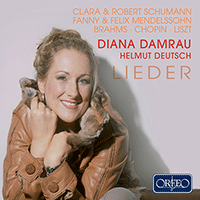
Fanny Mendelssohn-Hensel (1805 - 1847)
Fanny Cäcilie Hensel, née Mendelssohn, was born into an affluent banking family in 1805. Prodigiously talented, like her younger brother, Felix, Fanny studied with Berlin’s finest teachers and by thirteen could play an entire volume of Bach preludes from memory. Marrying the court painter Wilhelm Hensel in 1829, Sebastian Ludwig Felix, the couple’s only child, was born in 1830.
In 1831 Fanny Hensel revived the family practice of ‘sonntagsmusiken’, Sunday concerts in her home, during which she premiered her own compositions—eventually totalling over 250 lieder, 125 piano pieces, a string quartet, an overture, a piano trio and four cantatas—as well as presenting works by composers including Beethoven, Bach and Mozart. These events were attended by musicians, such as Liszt and Clara Schumann.
Fanny Hensel was a significant composer, but her career was restrained by early 19th-century attitudes toward women. Felix Mendelssohn wrote that publishing her music “would only disturb her in” her “primary duties” of managing her home. Several songs were published under Felix’s name, Italien (Grillparzer), becoming a favourite of Queen Victoria. An Italian sojourn (1839–40) saw Fanny Hensel achieve wider musical recognition and in 1846 she published her Opus 1–7. While rehearsing a ‘sonntagsmusiken’ on May 14, 1847 Mrs Hensel died of a stroke.
Now recognised an important figure in the development of lieder, Fanny Hensel has a growing reputation as a major 19th-century composer.
















